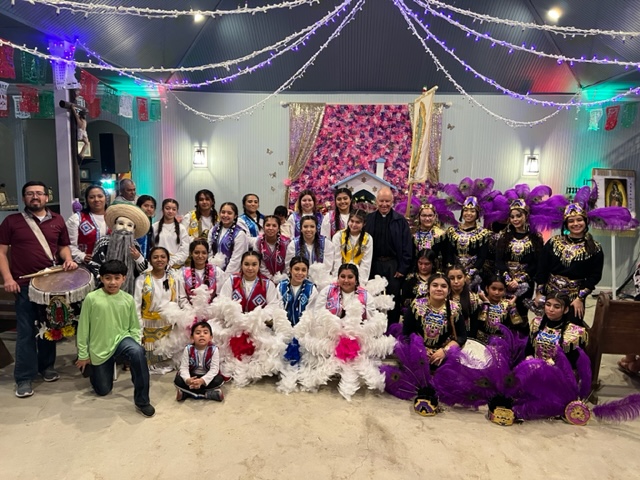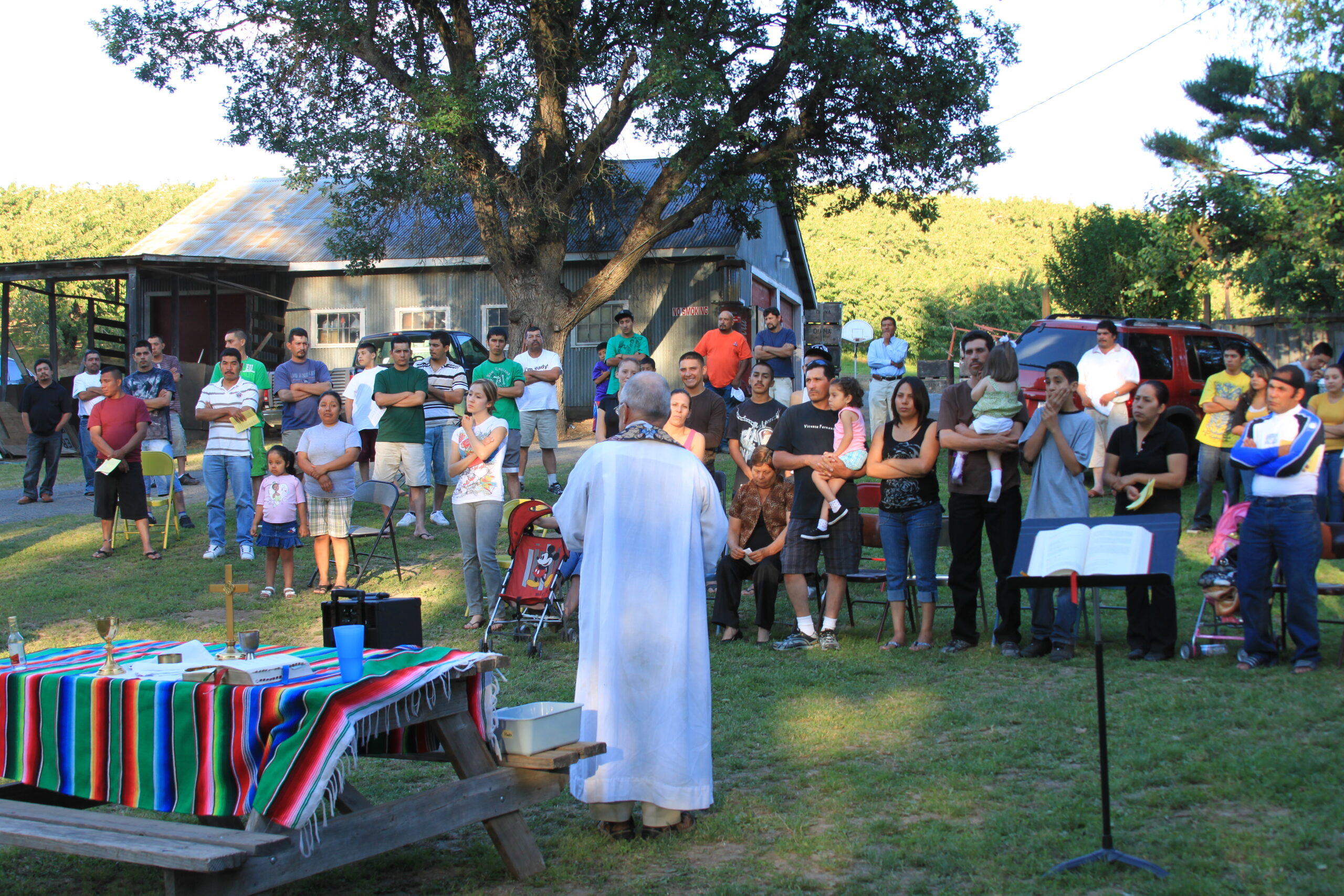Migration in Judeo-Christian history / La migración en la historia judeocristiana
(He escrito sobre este tema en el pasado, pero siempre es necesario reconsiderar nuestra historia humana de la migración. Un aspecto importante es la consideración de la reflexión religiosa sobre la migración. Consideraré esto durante los próximos tres días: la historia judeocristiana, la evangelización misionera en las Américas y el ministerio migratorio moderno)
La migración en la historia judeocristiana
El fundamento de la fe de Israel desde la historia de Abraham hasta el establecimiento del Reino de David es la historia de un pueblo itinerante que avanza hacia Dios y un lugar donde poder adorar en paz. Abraham recibió a personas de diferentes religiones con dignidad y respeto mientras recibía a los visitantes y les preparaba comida para que pasaran la noche con él. En una ocasión tres se quedaron con él y al salir, les profetizaron el nacimiento de un hijo a él y a Sara en su “vejez”. Le dio la bienvenida al sacerdote Melquisedec para que orara con él. Abraham estaba abierto a aprender acerca del “Dios Único” y llegó a ser conocido como nuestro padre en la fe.
Desde el Reino de David hasta el nacimiento de Jesús, a través de profetas y maestros se inició el desarrollo y codificación de la fe en el pueblo de Israel. El desarrollo del Antiguo Testamento tuvo lugar en una nación, pero era una nación influenciada por la interacción con varias culturas y pueblos. Hubo migraciones en la dispersión de pueblos de esta tradición judía a causa de las conquistas, los exilios y el comercio. Los autores de las Escrituras, los profetas y maestros, escribieron la historia del desarrollo de la fe basada en la confianza en la relación entre Dios y la humanidad. Las promesas del Antiguo Testamento se cumplen con el nacimiento de Jesús.
En la Resurrección, a los seguidores de Jesús se les dice que “hagan discípulos de todas las naciones”. Los Apóstoles y los primeros discípulos partieron como predicadores itinerantes, difundiendo la Buena Nueva. San Pablo llevó la Buena Nueva por toda la región del Mar Mediterráneo. La Iglesia se extendió a medida que los misioneros continuaron evangelizando y acercando a la gente a Cristo y la Iglesia.
El Concilio de Nicea (325 d.C.) declaró que la Iglesia era “una, santa, católica y apostólica”. El impulso apostólico o misionero de la Iglesia extendió el catolicismo por todo el Medio Oriente, el norte de África y Europa. El catolicismo en la India tiene raíces apostólicas. El mensaje del catolicismo era anunciar la salvación al mundo entero. La Iglesia misma era móvil, era misionera.
La identidad de la Iglesia como “católica” tiene que ver con la universalidad de la Iglesia. Era una Iglesia con aspiración de llegar a todos los rincones del mundo. Hoy la Iglesia está presente en todas las naciones, pero nos queda un largo camino por recorrer para realizar la unidad en medio de la diversidad de los pueblos.
(Si tienes observaciones o preguntas para Padre Migrante, envían las a padremigrante@gmail.com)
(I have written on this theme in the past, but there is always a need to re-consider our human history of migration. One important aspect is consideration of the religious reflection on migration. I will consider this for the next three days: Judeo-Christian history, Missionary evangelization in the Americas, and modern migration ministry)
Migration in Judeo-Christian history
The identification of the author of Deuteronomy with his ancestor Abraham being a “wandering Aramean” identifies the human search for God, for meaning, for security, and for a place to call home. The location of the development of Judeo-Christian faith is centered in the Middle East, in a part of the world where trade routes between Asia, Africa, and Europe crossed. The exposure to people of different race, history, custom, and religious expression had a significant influence on a region of the world that became the birthplace of Judaic, Christian, and Muslim faiths.
The foundation of the faith of Israel from the story of Abraham to the establishment of the Kingdom of David is the story of itinerant people moving towards God and a place where they could worship in peace. Abraham received people of different faiths with dignity and respect as he welcomed visitors and prepared meals for them so that they would spend the evening with him. On one occasion three stayed with him and as they left, they prophesied the birth of a son to him and Sarah in their “old age.” He welcomed Melchizedec, the priest, to pray with him. Abraham was open to learn about the “One God,” and became known as our father in faith.
From the Kingdom of David to the birth of Jesus, through prophets and teachers there was the development and codification of faith begun in the people of Israel. The development of the Old Testament took place in one nation, but it was a nation influenced by interaction with various cultures and people. There were migrations in the dispersion of people of this Jewish tradition because of conquest, exiles and trade. The authors of Scripture, the prophets and teachers, wrote the story of the development of faith based on a confidence in the relationship of God and humanity. The promises of the Old Testament are fulfilled in the birth of Jesus.
At the Resurrection, the followers of Jesus are told to “make disciples of all nations.” The Apostles and early disciples set out as itinerant preachers, spreading the Good News. St. Paul took the Good News throughout the region of the Mediterranean Sea. The Church spread as missionaries continued to evangelize and bring people to Christ and the Church.
The Council of Nicea (325 AD) declared the Church to be “one, holy, catholic and apostolic.” The apostolic or missionary thrust of the Church spread Catholicism throughout the Middle East, North Africa, and Europe. There are apostolic roots to Catholicism in India. The message of Catholicism was to announce salvation to the whole world. The Church itself was mobile, it was missionary.
The identity of the Church as “catholic” has to do with the universality of the Church. It was a Church with aspiration to reach all corners of the world. Today the Church is present in all nations, but we have a long way to go in realizing unity in the midst of the diversity of peoples.
(If you want Padre Migrante to respond to your concerns or questions, write to: padremigrante@gmail.com)
Oh Jesús, tú nos llamas: “Síganme”. Bendice, Señor, a todos los que acogen tu llamado. Puede que el camino no sea fácil, pero tenemos la confianza de que todo es posible si caminamos contigo. Que este viaje nos abra los ojos a las maravillas de tu amor por nosotros. Oramos por toda tu gente, por todos los creyentes e incrédulos, por los líderes y seguidores. Oramos por la sanación, el perdón, la compasión, la justicia y la paz. Oramos para que, al seguirte, nosotros también podamos ser pescadores de hombres. Bendícenos en nuestro viaje.
O Jesus, you call us, “Come after me.” Bless, O Lord, all who welcome your call. The path may not be easy, but we have confidence that all things are possible if we walk with you. May this journey, open our eyes to the wonders of your love for us. We pray for all your people, for all believers and unbelievers, for leaders and followers. We pray for healing, for forgiveness, for compassion, for justice, for peace. We pray that as we follow you, we too can be fishers of men. Bless us on our journey.



